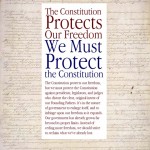Here is a taxpayer’s view of the intended and unintended consequences of the efforts of our noble Austin legislators.
First, one must read the proposed legislation because the brief explanatory statement of the nature of each proposed amendment listed on the ballot is not even close to addressing what is in the amendment. If a proposed amendment has enabling legislation (many do), the details of the amendment with taxing authority, penalties for violations, and other changes/additions to other state statutes may be found there. In short, you have to read the amendment/enabling bill to find out what’s in it and often times we have to pass the amendment/bill to find out what’s in it. On some of the proposed amendments, the enabling legislation is silent (deficient) in certain areas. Where there is silence in the enabling legislation, once the amendment is passed then it may be up to the courts to decide the intent of the author(s) of the amendment or enabling legislation. This is unfortunate but true.
Second, one should understand the Purpose and Consequences of laws.
Third, one should put each proposed amendment to the 3 question test of “constitutionality”.
Fourth, if one finds the proposed amendment to be worth the intended and unintended consequences of the government intervention, and the intervention passes all 3 questions of being constitutionally compliant, then a “yes” vote at the polls is worthy. If not, a “no” vote should always be cast.
Fifth, if one does not have the time to read and research a proposed amendment, then one should vote “no” until they have the opportunity to understand the proposed government intervention (this should also be exercised by legislators from the city, county, state and federal level). If one “no” vote decides the failure of a good amendment, then the proposed amendment will more than likely be offered again at a later date. The 83rd Texas Legislature proposed 293 amendments to the constitution. *10 of them passed (4%) both chambers. The legislative branch is not shy about proposing restrictions on the people, so the people should not be shy about voicing their concerns at the ballot box. This is the only opportunity to have a direct voice in what the government does. All other restrictive legislation is voted on by our representative government via legislative actions and unelected/appointed bureaucratic boards and commissions. The 83rd Legislature proposed 6142 bills and passed 1443 (24%). So, this is your opportunity to be a citizen legislator! All you need is to be a qualified registered voter , produce a qualified photo ID, and read and understand the amendments before casting a ballot.
The North Texas Citizens’ Lobby actively concentrates on the actions and voting records of our Austin officials. We encourage and teach others to do what we do. If interested, sign up for the monthly “newsletter” at https://ntcl.org/ on the upper right margin.
Sources:
The information on the 9 proposed amendments for this article are from:
• House Research Organization: Amendments Proposed for November 2013 Ballot
• Texas Legislative Council: Analyses of Proposed Constitutional Amendments, November 5, 2013 Election
• The proposed Joint Resolutions and enabling legislation (Bills)
• Various House and Senate members
• Texas Comptroller
• Collin County Commissioner court members
• Collin County Appraisal District
• Texas Legislature Online
• Various other internet available sources
(For your convenience, by clicking on the embedded links, you can find the wording of the proposals and enabling legislation for each proposition, below. You can also see how your Austin legislator voted on each of the 9 proposed amendments.)
+++++++++++++++++++++++++++
Prop 1 (HJR 62) / enabling legislation: SB 163
Tax Exemption for the Spouse of an Armed Service member Killed-in-Action
• In 2007, Texas voters adopted an amendment to the Texas Constitution that exempted from property taxes all or part of the value of the residence homestead of a veteran certified as having a service-related disability of “100 percent or as totally disabled”.
• In 2011 voters extended that exemption to the surviving spouse of a “100 percent or totally disabled veteran” if the surviving spouse has not remarried and the property was the residence homestead of the surviving spouse when the disabled veteran died. The exemption amount transfers to future homesteads in an amount equal to the exemption on the initial homestead property with certain restrictions.
• Prop 1 would extend this same property tax exemption to the surviving spouse of a member of the armed services of the United States who is killed in action.
…..The surviving spouse must remain unmarried
…..The surviving spouse can transfer the exemption to a future homestead property equal to the exemption amount of the initial homestead property (with certain restrictions).
…..Enabling legislation (SB 163) – takes effect January 1, 2014, but only if Prop 1 is approved by the voters. SB 163 amends The Tax Code to remove the minimum age of 65 years to qualify for this tax exemption and there is no sunset provision provided
…..Prop. 1 would not require that the surviving spouse already have a homestead in Texas at the time of the service member’s death. This would allow military families who rent or live in on-base housing to benefit from the exemption if they later became homeowners.
…..The tax exemption is mandatory on local taxing districts if passed in November.
• “Killed in Action” (Wikipedia) is defined by the Dept. of Defense as one who need not have fired their weapons but have been killed due to hostile attack. KIAs do not come from incidents such as accidental vehicle crashes and other “non-hostile” events or terrorism. Further, KIA denotes one to have been killed in action on the battlefield whereas died of wounds (DOW) relates to someone who survived to reach a medical treatment facility.
CONSTITUTIONAL TEST (Prop 1)
1.) Is it “constitutional”?
(Supports the constitutional republic)
Neutral – the Liberty and Pursuit of Happiness test.
Only survivors of veterans killed-in-action will be the direct beneficiaries
2.) Is there a need?
(Do all the People have a need and benefit for the proposed government intervention?)
Fail – there is not a need from all the people
3.) Affordability?
(Can the People afford it?) (a) Taxation shall be equal and uniform
Fail – The burden on taxpayers is unknown and the cost is not equal and uniform since spouses of veterans killed-in-action would be exempt from all or portions of ad valorem taxation for an unknown amount of time and the only people to directly benefit. There is no sunset or value threshold provision provided. The added tax burden of qualifying surviving spouses and their dependents from other states could add to the complexity and larger government in the county appraisal office. How is the property value limit appraised in this instance? This question was posed to the state comptroller’s office and the response was that the enabling legislation SB 163 (Van de Putte ), is silent on this matter therefore the courts will decide ( you have to pass the bill to find out what’s in it). The Collin County Appraisal district responded with: “From what we interpret at this time, the surviving spouse would be entitled to the full appraised value of a property when they move to Texas from out of state. They would not be able to bring any documentation from another state to qualify (transfer in). They essentially would need to qualify the new property in Texas as the base for the exemption. This may also necessitate an AG opinion. One problem with the bill, as written, would be if the spouse did not let the CAD know they had a previous homestead and wanted to qualify a new and higher valued property for the exemption “.
If the legislature continues to expand the categories of property owners who receive property tax exemptions, local governments may have to raise property taxes on other property owners in order to generate the same amount of revenue. As of 2011, taxpayers were $233 billion in the hole, with 83% held locally by cities, schools and water districts.
HJR 62:
House votes: 141 Yeas, 0 Nays
Senate votes: Yeas 31, Nays 0
SB 163 (enabling):
House votes: 146 Yeas, 0 Nays
Senate votes: 31 Yeas, 0 Nays
+++++++++++++++++++++++++++++++++++++++++
Prop 2 (HJR 79) / enabling: HB 1061
Removal of State Medical Education Bd
• In 1952, Texas created a six-member State Medical Education Board and established a State Medical Education Fund to provide grants, loans, or scholarships to students who wished to study medicine and agreed to practice in rural areas of Texas.
• In 1973 the legislature created the State Rural Medical Education Board
• In 1987, the state general appropriations act for fiscal 1988-89 included a rider stating the Legislature’s intent to transfer the duties of the State Rural Medical Education Board to the Texas Higher Education Coordinating Board.
• 1989, the Attorney General said the rider was unconstitutional and that the functions and duties of the State Rural Medical Education Board could not be transferred to the coordinating board by means of a rider.
• No new loans have been issued since January 1988. That same year, the Sunset commission recommended that the Medical Education Board be abolished
• The board has since finished servicing existing loans and has turned all remaining loans over to the attorney general for default collection.
• Many of the loans issued by the State Medical Education Board have gone into default and have been deemed uncollectable, leaving taxpayers on the hook
• Prop. 2 would repeal the constitutional language authorizing the inactive State Medical Education Board and State Medical Education Fund (Art. 3, sec 50a)
• The enactment by the 83rd Legislature of HB 1061 (Branch) already has eliminated references to these defunct entities in state law, and Prop. 2 would follow suit by removing constitutional authorization for the board and the fund.
CONSTITUTIONAL TEST (Prop 2)
1.) Is it “constitutional”?
(supports the constitutional republic)
Pass – Assuming that the information offered by the HRO and the TX Legislative Council to be correct, Prop 2 will serve to repeal outdated and un-necessary wording in the Texas Constitution
2.) Is there a need?
(Do all the People have a need and benefit for the proposed government intervention?)
Pass – Assuming that the information offered by the HRO and the TX Legislative Council to be correct, Prop 2 is a housekeeping action and there is no effect on all the people.
3.) Affordability?
(Can the People afford it?) (a) Taxation shall be equal and uniform
Pass – Assuming that the information offered by the HRO and the TX Legislative Council to be correct, Prop 2 is a housekeeping action and all the people are not affected.
HJR 79:
House votes: 145 Yeas, 0 Nays
Senate votes: Yeas 30, Nays 0
HB 1061 (enabling):
House votes: 137 Yeas, 0 Nays
Senate votes: Yeas 30, Nays 0
+++++++++++++++++++++++++++++++
Prop 3 (HJR 133) / enabling HB 3121
Allowing time extension of exemption from inventory taxes for aircraft parts
• Texas is one of a small number of states that assesses a property tax on inventory.
• Prop 3 only applies to “Aircraft Parts”.
• Currently, both the Texas Constitution and state statutes exempt from ad valorem taxation “freeport” property that is located in the state temporarily (175 days).
• Freeport property = goods, wares, ores, and merchandise other than oil, gas, and petroleum products (defined as liquid and gaseous materials immediately derived from refining petroleum or natural gas) and to aircraft or repair parts used by a certificated air carrier.
• Currently under the Texas Constitution, to qualify for the exemption from inventory taxes, such goods, wares, merchandise, and other tangible personal property must have been:
•…. acquired in or imported into Texas;
• ….detained for assembly, storage, manufacturing, processing, or fabrication; and
• ….shipped out of Texas no later than 175 days after acquisition or importation.
• ….Regarding freeport tax exemptions, the TEXAS CONSTITUION allows …
CERTAIN TANGIBLE PERSONAL PROPERTY EXEMPT FROM AD VALOREM TAXATION. (a) To promote economic development in the State…
• Prop 3 proposes to extend the tax exempt time table in inventory from 175 days to 730 days.
• This measure would be applied entirely at the discretion of local taxing entities (municipal, School Districts, College Districts, etc.) meaning it is not mandatory upon local taxing districts, but available. However the process of local adoption of the tax exemption varies from taxing district to taxing district. It is up to each taxing district’s procedures as to whether the decision to adopt the exemption would be a district board decision or a public decision decided by the voters at the ballot box.
CONSTITUTIONAL TEST (Prop 3)
1.) Is it “constitutional”?
(supports the constitutional republic)
Fail – Note: This tax exemption only benefits industries that inventory airplane parts, thus singles out one group for tax preference. Each taxing entity may or may not allow the voters to vote on acceptance, as this is left up to each district’s procedures.
2.) Is there a need?
(Do all the People have a need and benefit for the proposed government intervention?)
Fail – All the people and all industries do not demonstrate a need and will not receive direct benefits. Each taxing entity may or may not allow the voters to vote on acceptance, as this is left up to each district’s procedures.
3.) Affordability?
(Can the People afford it?) (a) Taxation shall be equal and uniform
Fail – Prop. 3 would allow a political subdivision to extend a freeport exemption for a specific group selling goods for certain purposes. Singling out one group for a tax exemption, even for a meritorious purpose, raises issues of uniformity in taxation. If the extension were authorized for aircraft parts, similar industries that make specialized parts and accumulate a great deal of idle inventory would be justified in seeking a similar extension. The taxable value of the parts that would become subject to the exemption cannot be predicted. Tax exemptions may force local governments to raise property taxes on other property owners in order to generate the same amount of revenue. Once extended, the tax exemption is prohibited from being rescinded (Article VIII, Section 1-j of the Texas Constitution). Each taxing entity may or may not allow the voters to vote on acceptance of the tax exemption, as this is left up to each district’s procedures.
NOTE: Section 1, Article VIII, Texas Constitution, provides that all real property and tangible personal property, unless exempt as required or permitted by the constitution, shall be taxed according to its value. Any exemption from property (or “ad valorem”) taxation not granted or authorized by the Texas Constitution is invalid. Neither the legislature nor a political subdivision of the state that imposes property taxes may exempt property from taxation without constitutional authority.
HJR 133
House votes: 142 Yeas, 0 Nays
Senate votes: Yeas 31, Nays 0
HB 3121 (enabling)
House votes: 144 Yeas, 0 Nays
Senate votes: Yeas 31, Nays 0
+++++++++++++++++++++++++++++++++++++++++++
Prop 4 (HJR 24) / enabling HB 97
Tax exemptions for disabled veterans and surviving spouse whose homestead was donated by a charity
• In 2007, Texas voters adopted an exemption from property taxes all or part of the value of the residence homestead of a veteran certified as having a service-related disability of “100 percent or as totally disabled”.
• In 2011 voters extended that exemption to the surviving spouse of a “100 percent or totally disabled veteran” if the surviving spouse has not remarried and the property was the residence homestead of the surviving spouse when the disabled veteran died. The exemption amount transfers to future homesteads in an amount equal to the exemption on the initial homestead property with certain restrictions.
• Prop 4 removes the required minimum age of 65 years of age for tax exemption qualification
• Prop. 4 would allow for a homestead exemption from property taxes equal to the veteran’s degree of disability if the residence homestead was donated to the disabled veteran by a charitable organization at no cost to the veteran. Charitable Organization for this exemption means: “an organization that is exempt from federal income taxation under Section 501(a), Internal Revenue Code of 1986, as an organization described by Section 501(c)(3) of that code.”
• Prop 4 allows the proposed tax exemption to transfer to the surviving spouse if the veteran dies after qualifying for the new exemption and the property was the residence homestead of the surviving spouse who has not remarried. The surviving spouse is entitled to transfer the exemption amount to future homesteads in an amount equal to the exemption on the initial homestead property.
• Prop 4 if passed, is mandatory on all taxing districts
CONSTITUTIONAL TEST (Prop 4)
1.) Is it “constitutional”?
(supports the constitutional republic)
Neutral – the Liberty and Pursuit of Happiness test. Only disabled veterans and surviving spouses who receive a 100% donated homestead from a charitable organization will be the direct beneficiaries. Local appraisal districts have difficulty maintaining qualification status of surviving spouses which means increased costs of government.
2.) Is there a need?
(Do all the People have a need and benefit for the proposed government intervention?)
Fail – there is not a need from all the people.
3.) Affordability?
(Can the People afford it?) (a) Taxation shall be equal and uniform
Fail – the burden on taxpayers is unknown. The cost is not equal and uniform. Certain veterans and their surviving spouses would be exempt for an unknown amount of time and the only people to directly benefit. There is no minimum age to qualify for the tax exemption. There is no sunset or value threshold provision provided. Concerns that property owners who receive property tax exemptions will force local governments to raise property taxes on other property owners in order to generate the same amount of revenue and undermine uniformity in taxation. Local appraisal districts are responsible for maintaining qualification status of surviving spouses which is difficult and equates to increased costs of government.
HJR 24:
House votes: 144 Yeas, 0 Nays
Senate votes: Yeas 31, Nays 0
HB 97 (enabling)
House votes: 146 Yeas, 0 Nays
Senate votes: Yeas 31, Nays 0
+++++++++++++++++++++++++++++++
Prop 5 (SJR 18) …no enabling legislation
Authorizing a reverse mortgage loan for the purchase of homestead property
• A reverse mortgage is a loan advanced on the basis of equity in the borrower’s homestead, which is the difference between a home’s market value and what is owed on the home.
• The minimum age of borrower is set at 62 years
Reverse Mortgage – what is it?
• Generally speaking, it is a credit agreement under which a creditor provides money to a borrower in exchange for a lien on the borrower’s home and the borrower is generally not required to repay the money or interest on the money until:
….. Borrower dies,
….. Sells the home,
….. Permanently moves out of the home,
….. Violates conditions of contract (numerous provisions)
• Texas is the only state in which seniors cannot get reverse mortgages for home purchases.
• 1997 – Texas voters adopted a constitutional amendment that allowed new types of loans that could be secured using a homestead as collateral and allowed the proceeds of those loans to be used for any purpose, included was a reverse mortgage. The state constitution required those advances to be made in the form of a single lump-sum payment or in multiple payments of equal amounts at regular intervals.
• 1999, Texas voters approved a constitutional amendment conforming state law on reverse mortgages to federal law and allowed a borrower to request that one or more of the regular advances be reduced in amount.
• 2003, the constitution was further amended to allow a borrower to convert an existing home equity loan into a reverse mortgage.
• 2005, Again the constitution was amended to allow a borrower to receive advances on a reverse mortgage in the form of a line of credit, only at the times and in the amounts requested by the borrower. This amendment also prohibited borrowers from obtaining an advance on a reverse mortgage by using a credit card, debit card, or similar device to discourage the use of line of credit advances or other advances for frivolous purposes or in response to enticement.
• 2009, the federal government created the home equity conversion mortgage for purchase, and it became available as an option under The United States Department of Housing and Urban Development (HUD). The HUD program administers the home equity conversion mortgage program (HECM).
• HECM for purchase are not offered in Texas because under current state law, borrowers are not permitted to use equity accumulated in their existing home and a reverse mortgage to finance the purchase of a new home. Prop. 5 would allow Texas seniors to combine these steps into a single transaction, thereby saving money on closing costs and allowing them to move into a new home without a mortgage payment
• Prop 5 expands the financial counseling requirement for all reverse mortgages by requiring that both the prospective borrower of a reverse mortgage and the borrower’s spouse complete the counseling within a certain time before the reverse mortgage is closed.
• Prop 5 requires a written notice be provided by lenders to borrowers of a reverse mortgage, describing actions or inactions of the borrower that could result in a possible foreclosure of the reverse mortgage. The notice must be provided at least 12 days before the closing rather than at the closing.
• Foreclosure by lender may occur if borrower fails to:
….. pay taxes and insurance
….. occupy property
….. maintain property
….. settle secondary liens on the property
• Payment of principle & interest on the reverse loan is due when:
(A) all borrowers have died;
(B) the homestead property securing the loan is sold or otherwise transferred;
(C) all borrowers cease occupying the homestead property for a period of longer than 12 consecutive months without prior written approval from the lender; or
(D) the borrower:
…(i) defaults on an obligation specified in the loan documents to repair and maintain, pay taxes and assessments on, or insure the homestead property;
…(ii) commits actual fraud in connection with the loan; or
…(iii) fails to maintain the priority of the lender’s lien on the homestead property, after the lender gives notice to the borrower, by promptly discharging any lien that has priority or may obtain priority over the lender’s lien within 10 days after the date the borrower receives the notice, unless the borrower:
(a) agrees in writing to the payment of the obligation secured by the lien in a manner acceptable to the lender;
(b) contests in good faith the lien by, or defends against enforcement of the lien in, legal proceedings so as to prevent the enforcement of the lien or forfeiture of any part of the homestead property; or
(c) secures from the holder of the lien an agreement satisfactory to the lender subordinating the lien to all amounts secured by the lender’s lien on the homestead property;
• Reverse Mortgages are very confusing. Relative to reverse mortgages, the Texas Constitution states “Although payment of principal or interest shall not be required under a reverse mortgage until the entire loan becomes due and payable, interest may accrue and be compounded during the term of the loan as provided by the reverse mortgage loan agreement.”
CONSTITUTIONAL TEST (Prop 5)
1.) Is it “constitutional”?
(supports the constitutional republic)
Pass – Property owners are free to dispense their property in the manner they deem most beneficial to them, however the details of actual closing papers is not known at the date of this posting. There is concern that elderly property owners may be remiss in protecting their best interests.
2.) Is there a need?
(Do all the People have a need and benefit for the proposed government intervention?)
Neutral – only those 62 years of age and older qualify for this restriction; Prop 5 does not appear to add more layers of government intervention.
3.) Affordability?
(Can SENIORS afford it?)
Neutral – This answer cannot be predicted with the wide variety of circumstances for each borrower and the wide variety of stipulations made by each lender.
SJR 18
House votes: 139 Yeas, 1 Nays (Phillips)
Senate votes: Yeas 31, Nays 0
+++++++++++++++++++++++++++++++++++
Prop 6 (SJR 1) / enabling: HB 4
Creating funds to assist in the financing of priority projects in the state water plan
• 2011 – Texas voters passed Prop 2, with a narrow 1.5% margin, which authorized the Texas Water Development Board (TWDB) to issue general obligation bonds as long as the total amount did not exceed $6 billion at any time. That money has barely been touched.
• Prop 6 creates the State Water Implementation Fund for Texas and the State Water Implementation Revenue Fund for Texas to assist in the financing of water supply projects in the state water plan to ensure the availability of adequate water resources.
• Prop 6 further proposes to take $2 billion from the Economic Stabilization Fund (aka the “rainy day” fund), and use it to supplement the financing of water projects.
FYI…during the THIRD Special Session in August, SJR 1 (authored by 20 Senators), is a proposed constitutional amendment that was passed in both chambers, but will NOT appear on this year’s ballot. This proposal has to do with funding transportation needs. Through negotiations to get the proposal passed in both chambers, this constitutional amendment was created to be on the 2014 ballot, and not to be included with the 9 propositions coming up this November 5th. The transportation funding amendment (Nov 2014) also raids the Economic Stabilization Fund (aka the “rainy day” fund). As one can see, Prop 6 proposes to take from the Economic Stabilization Fund for “water” needs. If the 2 proposals to raid the Economic Stabilization Fund were on the same ballot that may force voters to decide between water or transportation needs. It is hoped that voters will remember this in 12 months when most attention will be on the General Election of federal, state, county, and local officials. A conversation with your Austin legislator is advised to inquire how they voted on these measures and why. On the transportation amendment, three senators voted NO and twenty House members voted NO. The North Texas Citizens’ Lobby actively concentrates on the actions and voting records of our Austin officials. We encourage and teach others to do what we do. If interested, sign up for the monthly newsletter at https://ntcl.org/ on the upper right margin.
CONSTITUTIONAL TEST (Prop 6)
1.) Is it “constitutional”?
(Supports the constitutional republic)
Fail – The voters do not understand the funding mechanisms for water, nor that the $6 billion that taxpayers approved 2 years ago has barely been tapped to date.
2.) Is there a need?
(Do all the People have a need and benefit for the proposed government intervention?)
Fail – Funding is the purpose of Prop 6. All the people do not need funding. The problem with water availability is the permitting process, not funding.
3.) Affordability?
(Can the People afford it?)
Fail – If funding is the purpose of Prop 6, the Water Development Board currently oversees many funding mechanisms that most communities have current access to. If funding mechanisms are already available, why raid the Economic Stabilization Fund (aka the “rainy day” fund)? Raiding Texas’s savings account for an ongoing expenditure is unreasonable at best and fiscal dereliction of duty at worst. Texas currently has ample financing for water projects and provides the best access to capital of all government functions in Texas. Currently there are over a dozen constitutionally dedicated accounts and funding mechanisms for water development that are accessible by most communities in Texas. The problem with water development is not the funding but in the slow permitting process.
SJR 1
House votes: 108 Yeas, 34 Nays (Capriglione; Fallon; Goldman; Gooden; Isaac; Klick; Krause; Laubenberg; Perry; Schaefer; Simpson; Stickland; Taylor; Thompson, E.; Turner, E.S.; Zedler) *see statement of votes
Senate votes: Yeas 31, Nays 0
HB 4 (enabling)
House votes: 141 Yeas, 4 Nays (Klick; Simpson; Stickland; Taylor)
Senate votes: Yeas 30, Nays 1 (Seliger)
+++++++++++++++++++++++++++++++++++
Prop 7 (HJR 87) / enabling: HB 1372
Allowing home-rule cities to decide how to fill vacant elected seats
• Prop 7 applies only to home-rule municipalities because general-law municipalities do not have charters.
• Prop 7 would allow a home-rule municipality with a governing body that has terms of office of more than two years to determine the procedure to fill a short-term vacancy on the governing body. (*The enabling legislation states that this applies to “FILLING VACANCY ON GOVERNING BODY OF MUNICIPALITY WITH POPULATION OF 1.5 MILLION OR MORE” However – through communications with the author of the proposed amendment, this proposition applies to ALL cities with city charters, regardless of population)
• The current law on City Council vacancies:
….. two-year term: city may specify the procedure for filling vacancies for the remainder of the term through its city charter, including by appointment
….. three or four year terms: must fill vacancies via mandatory special election (appointments prohibited) within 120 days after the date the vacancy occurs, regardless of the number of months remaining in the member’s vacated term
Prop 7 creates an exception to current rule that authorizes a home-rule municipality with more than 2 years for terms of office to provide by its charter or a charter amendment the procedure to fill a vacancy on the governing body for which the unexpired term is 12 months or less, whether it be appointment or election.
PROS & CONs
Pros of “appointment” vs Special Election:
• Avoid expensive special elections thus cutting taxpayer costs
• Savings to Candidates – costs for special election & regular election campaign
Pros of “Special Election vs appointment:
• Special elections ensure accountability to the voters
• Prop 7 supports the fact that the strongest political power of the people is at the local level and these decisions should rest on those that live under that governing body.
• Prop 7 has a down side in that too few citizens attend city council meetings to know who their legislators are, much less what their legislators are doing.
CONSTITUTIONAL TEST (Prop 7)
1.) Is it “constitutional”?
(Supports the constitutional republic)
Pass – Citizen participation in and control over governments is strongest at the local level. Removing the state restriction on how certain municipalities fill vacancies on their governing body favors local control over state control.
2.) Is there a need?
(Do all the People have a need and benefit for the proposed government intervention?)
Neutral – Prop 7 will allow current home rule cities with more than 2 year terms on the governing body the option to amend current city charters to address the procedures to fill a short term vacancy. The loosening of state restrictions will also allow newly formed Home-Rule cities to take advantage of this local decision when creating their City Charter. All city charter amendments must be voter approved.
3.) Affordability?
(Can the People afford it?)
Pass – Although municipal entities must share in the cost of conducting elections, choosing a General Election Date can allow a savings over a Special Election date. In choosing a General Election date, the city can share with other governmental bodies holding elections. The voters/taxpayers are required to approve/disprove city charters and the amendments. They are responsible for paying for the city government and should be allowed a voice in same.
HJR 87
House votes: 129 Yeas, 2 Nays (Branch; Klick) *see statement of votes
Senate votes: Yeas 31, Nays 0
HB 1372 (enabling)
House votes: 141 Yeas, 4 Nays (Capriglione; Fallon; Klick; Stickland) *see statement of votes
Senate votes: Yeas 31, Nays 0
++++++++++++++++++++++++++++++++++++
Prop 8 (HJR 147 & SJR 54) …no enabling
To Repeal Tax limit on Hidalgo Hospital District
• 1960 constitutional amendment to create special hospital districts in certain counties, including one in Hidalgo County at a maximum tax rate of 10 cents per $100 valuation of taxable property value
• 1962 voters approved the creation of hospital districts composed of one or more counties, or all or any part of one or more counties, at a maximum tax rate of 75 cents.
• Prop. 8 would repeal Art. 9, sec. 7 of the Texas Constitution which limits Hidalgo County to a maximum tax rate of 10 cents per $100 valuation of taxable property for the hospital district.
• Hidalgo is the largest county in Texas without a hospital district and the only one in the state with a maximum tax rate of 10 cents per $100 property valuation for a hospital district. It also has one of the lowest tax bases per capita, making it difficult to raise sufficient money at the 10 cent maximum tax rate.
• Hidalgo is one of the fastest growing counties in the United States (775K in 2010). It includes the city of McAllen – across the Rio Grande River from the Mexican city of Reynosa. Sixty miles to the southeast is Brownsville, TX and Matamoras, Mexico.
• Prop 8 was created by 2 identical Joint Resolutions – one originating in the House (HJR 147, by Rep. Guerra of Hidalgo County), and one originating in the Senate (SJR 54, by Sen. Hinojosa of Hidalgo County). Sen. Hinojosa states on his official TX Senate webpage that he has “passed legislation to allow South Texas communities and hospitals to draw down millions of federal matching funds to expand and invest in their healthcare infrastructure and to reimburse hospitals for indigent care through a federal 1115 Healthcare Transformation Waiver”
• There is legislation supporting Prop 8; HB 3793 (by Rep. Coleman / Sen. Hinojosa as sponsor). Rep. Coleman is a 10yr incumbent representing a portion of Houston. The bill makes numerous changes to the powers, duties, and services of entities serving counties, and includes provisions for Hidalgo County commissioners and voters to create a hospital district with a maximum tax rate of 75 cents per $100 property valuation. The omnibus bill passed and already took effect September 1st…
May 26th, the House voted to adopt the Conference Committee report on HB 3793: (from the House Journal):
Representative Taylor raises a point of order against further consideration of the conference committee report on HB 3793 under Rules addressing the one-subject rules and the germaneness of the many issues addressed in the bill. The point of order overruled by acting Speaker of the House that day (Rep. Linda Harper-Brown).
House Vote: 26 Nays :
In the senate it passed with no NAY votes.
HB 3793 is noteworthy in that page 15 of 38, states:
(b)The Hidalgo County Commissioners Court shall order an election for the registered voters of Hidalgo County on the question of creation of the Hidalgo County Hospital District if the commissioners court receives a petition requesting an election that is signed by at least 50 registered voters who are residents of Hidalgo County.
However, page 33 of 38 states:
SUBCHAPTER G. DISSOLUTION
Sec. 1122.301. DISSOLUTION; ELECTION. (a) The district may be dissolved only on approval of a majority of the voters voting in an election held for that purpose.
(b)The board may order an election on the question of dissolving the district and disposing of the district’s assets and obligations.
(c)The board shall order an election if the board receives a petition requesting an election that is signed by at least 15 percent of the district ’s registered voters.
• Prop. 8 could open the door to an increase in taxes for Hidalgo County property owners. The new tax rate for a hospital district in Hidalgo County could be set as high as 75 cents per $100 property valuation via petition of only 50 registered voters in a county with a population of over 770K.
• Legislative documents claim that other Texas counties have shown the ability to operate successful hospital districts with tax rates that range on average between 20 and 40 cents per $100 property valuation but one should question the demographics of the counties that successfully charge 20 to 40 cents. There is concern that a small proportional amount of property owners to non-property owners will be required to absorb the brunt of the tax burden, therefore usurping uniformity in taxation.
• From the House Research Organization’s report:
Prop. 8 would allow Hidalgo County, with voter approval, to create a district capable of serving a community with a high rate of uninsured residents, making health care more affordable, and strengthening the region’s ability to draw federal funds to pay for emergency care for the poor.
CONSTITUTIONAL TEST (Prop 8)
1.) Is it “constitutional”?
(supports the constitutional republic)
Neutral – Currently the state has the power to allow local voters to create county hospital districts with funding provided through ad valorem taxes (tax on property). TX CONST, Article 9, sec. 4: COUNTY-WIDE HOSPITAL DISTRICTS
2.) Is there a need?
(Do all the People have a need and benefit for the proposed government intervention?)
Fail – Currently there are functioning private hospitals in Hidalgo County which indicates that there is not unanimous need for taxpayer funded hospitals.
3.) Affordability?
(Can the People afford it? – specifically the property owners?)
Fail – Hospital Districts are funded through ad valorem taxes which may or may not directly benefit the taxpayer. In the case of Hidalgo County, HB 3793 allows a minimum of 50 registered voters to petition the Hidalgo Commissioner Court to order an election to create a hospital district with a property tax rate up to 75 cents per $100 valuation. This is an unfair proportion of “voters” to property owners in such a populous county with an abnormally high population of indigent residents, and also located in close proximity to the border of Mexico. In addition, HB 3793 requires a petition from 15% of the county voters to force the Hidalgo County Commissioner Court to order an election to dissolve the hospital district. This increased amount of petitioner requirements to dissolve the taxing district (15%) is unfair vs. the smaller amount (50 voters) to propose the taxing district. Not all “voters” are property owners.
HJR 147
House votes: 145 Yeas, 0 Nays
Senate votes: Yeas 29, Nays 0.
HB 3793
House votes: 113 Yeas, 26 Nays (Bell; Button; Capriglione; Carter; Craddick; Creighton; Fletcher; Goldman; Hughes; Isaac; Kleinschmidt; Krause; Lavender; Leach; Parker;
Phillips; Sanford; Schaefer; Sheets; Simpson; Stickland; Taylor; Thompson, E.; Toth; Turner, E.S.; White) *see statement of votes
Senate votes: Yeas 31, Nays 0
++++++++++++++++++++++++++++++
Prop #9 (SJR 42) / enabling: SB 209
Expanding the State Commission on Judicial Conduct’s sanctioning authority
The following is from the Texas Legislative Council – *Analyses of Constitutional Amendments…
The proposed amendment expands the sanctions available for assessment by the commission following a formal proceeding by authorizing the commission to issue an order of public admonition, warning, reprimand, or requirement that the judge or justice obtain additional training or education in addition to the currently authorized punitive sanctions. The proposed amendment applies only to a formal proceeding instituted by the commission on or after January 1, 2014.
CONSTITUTIONAL TEST (Prop 9)
1.) Is it “constitutional”?
(Supports the constitutional republic)
Pass – Allowing the expansion of the ability of the State Commission on Judicial Conduct to consider more alternatives in remedy to a complaint will allow an ability to consider lesser as well as greater charges, and transparency in the judicial review process.
2.) Is there a need?
(Do all the People have a need and benefit for the proposed government intervention?)
*Neutral – It is difficult to determine a need by all the people.
3.) Affordability?
(Can the People afford it?)
*Neutral – It is difficult to determine the cost of the expansion of review for the State Commission on Judicial Conduct.
*One should read the explanation of Prop 9 in both the House Research Organization: Amendments Proposed for November 2013 Ballot
And…
Texas Legislative Council: Analyses of Proposed Constitutional Amendments, November 5, 2013 Election
SJR 42
House votes: 141 Yeas, 1 Nays (Phillips)
Senate votes: Yeas 31, Nays 0
SB209
House votes: 137 Yeas, 2 Nays (Lavender; Phillips)
Senate votes: Yeas 31, Nays 0
+++++++++++++++++++++++++++++++++++
Early voting on these proposed amendments to the Texas Constitution begins Monday Oct 21st . Check your county elections website for locations and hours, or contact them by phone. You do not have to cast a vote on all 9 proposed amendments, but if in doubt about a particular issue, a “no” vote is advised. If your “no” vote causes the measure to fail and it is a good proposal, it will come up again when you have more time to research it.
###

Barbara, thanks for htis great review with all your references….so how are you voting on 5, 7 and 9?
I meant 5, SIX, and 9!
Barry,
As a group, NTCL does not endorse or advise on how to vote. As individuals we are very vocal, and PERSONALLY I will be voting “no” for all except 2, 7, and not sure yet on 9. I should vote no when the measure doesn’t pass all 3 questions of constitutionality. Props 2 & 7 pretty much adhere to this test. Personally I want to do some more research on 9. I’m not a lawyer or a judge and need to find some who are that can help me with my questions. You might wish to watch the 10 minute presentation that Justice David Evans gave to the Allen Area Patriots a week ago. His presentation begins at 46 minutes: http://vimeo.com/76953565
We were very grateful to David for taking the time to explain this proposed action. I hope you will find it beneficial too!
Barbara, based on your comments above….and the NTCL analysis based on constitutionality, need and affordability… I conclude that you and your organization are against all but 2 & 7 and undecided on 9. I have footnoted these in my chart as follows: *NTCL [North Texas Citizens Lobby] does NOT make recommendations; the recommendations above are my presumed conclusion based on their analyses of constitutionality, need and affordability of each Proposition; I have taken their judgements of Pass, Fail, Neutral and projected them to a For or Against position; https://ntcl.org/2013/10/17/9-proposed-amendments-put-through-the-constitutional-test/#more-973 Hope this keeps your group in a good light. Why can’t your group come out with direct recommendations? These are not political candidates. These are issues. Thanks for your work. Barry
Barry,
Thank you for what the Texas Patriots Tea Party is doing in getting information out on the Nov 5th ballot! As for NTCL, as of this time our steering committee has not met to compare the intentions of how each will vote on the 9 propositions, much less have we conducted a poll to all who participated with NTCL during the 83rd legislative session(s). We should probably do this! However, I think I can accurately predict that there will not be a unanimous vote across all 9 propositions. Our goal as an organization is to keep in contact with our government officials, watch what they are doing, broadcast that information, and encourage others to join us and let us teach them what we’ve learned.
We encourage educated and civil discourse with our officials and amongst our neighbors. We certainly don’t discourage other organizations from telling voters how to vote. Personally, I want to educate my neighbors on the facts of the issue, and ask THEM to make up their mind. Feed a man a fish and you feed him for a day. Teach him how to fish, and you feed him for a lifetime. I only wish this worked when it came to voters. So, I understand the value of telling neighbors how to vote, and for your efforts I am truly grateful!
I hope I’m not irritating you too much.
Barbara, no you are not irritating. Thank you for what you are doing as well. Yes, our goal should ALWAYS be an informed electorate….. we are far from this goal, however.
Barbara, Thanks for all your work in gathering this information. It is a definite help in sorting out the proposed amendments.
Great work and a great help in understanding the proposed amendments! This is exactly how former U.S. Rep. from the Dallas area, Bruce Alger, would vote on legislation. He would ask, do we need it?, can we afford it?, is it constitutional? If he couldn’t answer “yes” to all 3, he voted against it. Imagine how much better off this country would be if our elected officials followed this example. It ought to be our responsibility to make sure they do. Term limits are a great place to start.